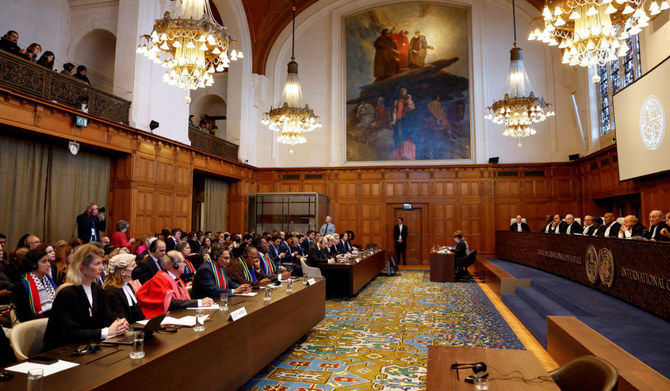THE HAGUE: The UN’s top court will from Monday hold hearings on the legal consequences of Israel’s occupation of Palestinian territories since 1967, with an unprecedented 52 countries expected to give evidence.
Nations including the United States, Russia, and China will address judges in a week-long session at the Peace Palace in The Hague, seat of the International Court of Justice (ICJ).
In December 2022, the UN General Assembly asked the ICJ for a non-binding “advisory opinion” on the “legal consequences arising from the policies and practices of Israel in the Occupied Palestinian Territory, including East Jerusalem.”
While any ICJ opinion would be non-binding, it comes amid mounting international legal pressure on Israel over the war in Gaza sparked by the brutal October 7 Hamas attacks.
The hearings are separate from a high-profile case brought by South Africa alleging that Israel is committing genocidal acts during the current Gaza offensive.
The ICJ ruled in that case in January that Israel must do everything in its power to prevent genocide and allow humanitarian aid into Gaza, but stopped short of ordering a ceasefire.
On Friday, it rejected South Africa’s bid to impose additional measures on Israel, but reiterated the need to carry out the ruling in full.
The General Assembly has asked the ICJ to consider two questions.
Firstly, the court should examine the legal consequences of what the UN called “the ongoing violation by Israel of the right of the Palestinian people to self-determination.”
This relates to the “prolonged occupation, settlement and annexation of the Palestinian territory occupied since 1967” and “measures aimed at altering the demographic composition, character and status of the Holy City of Jerusalem.”
In June 1967, Israel crushed some of its Arab neighbors in a six-day war, seizing the West Bank including east Jerusalem from Jordan, the Golan Heights from Syria, and the Gaza Strip and Sinai Peninsula from Egypt.
Israel then began to settle the 70,000 square kilometers (27,000 square miles) of seized Arab territory. The UN later declared the occupation of Palestinian territory illegal. Cairo regained Sinai under its 1979 peace deal with Israel.
The ICJ has also been asked to look into the consequences of what it described as Israel’s “adoption of related discriminatory legislation and measures.”
Secondly, the ICJ should advise on how Israel’s actions “affect the legal status of the occupation” and what are the consequences for the UN and other countries.
The court will rule “urgently” on the affair, probably by the end of the year.
The ICJ rules in disputes between states and its judgments are binding although it has little means to enforce them.
However, in this case, the opinion it issues will be non-binding.
In the court’s own words: “The requesting organ, agency or organization remains free to give effect to the opinion by any means open to it, or not to do so.”
But most advisory opinions are in fact acted upon.
The ICJ has previously issued advisory opinions on the legality of Kosovo’s 2008 declaration of independence from Serbia and apartheid South Africa’s occupation of Namibia.
It also handed down an opinion in 2004 declaring that parts of the wall erected by Israel in the occupied Palestinian territory were illegal and should be torn down.
Israel is not participating in the hearings and reacted angrily to the 2022 UN request, with Prime Minister Benjamin Netanyahu calling it “despicable” and “disgraceful.”
The week after the UN resolution, Israel announced a series of sanctions against the Palestinian Authority to make it “pay the price” for pushing for it.
Human Rights Watch (HRW) said that while advisory opinions are non-binding, “they can carry great moral and legal authority” and can eventually be inscribed in international law.
The hearings should “highlight the grave abuses Israeli authorities are committing against Palestinians, including the crimes against humanity of apartheid and persecution,” said Clive Baldwin, HRW senior legal adviser.






















